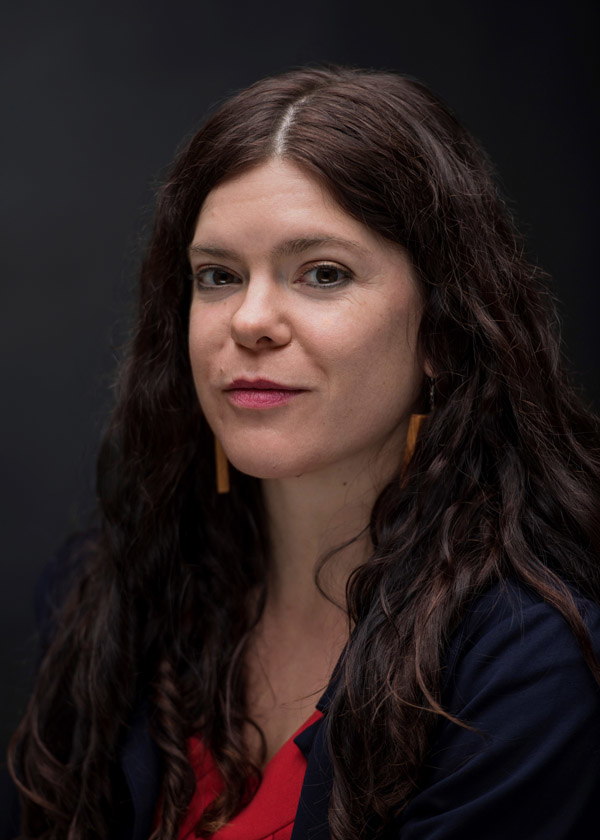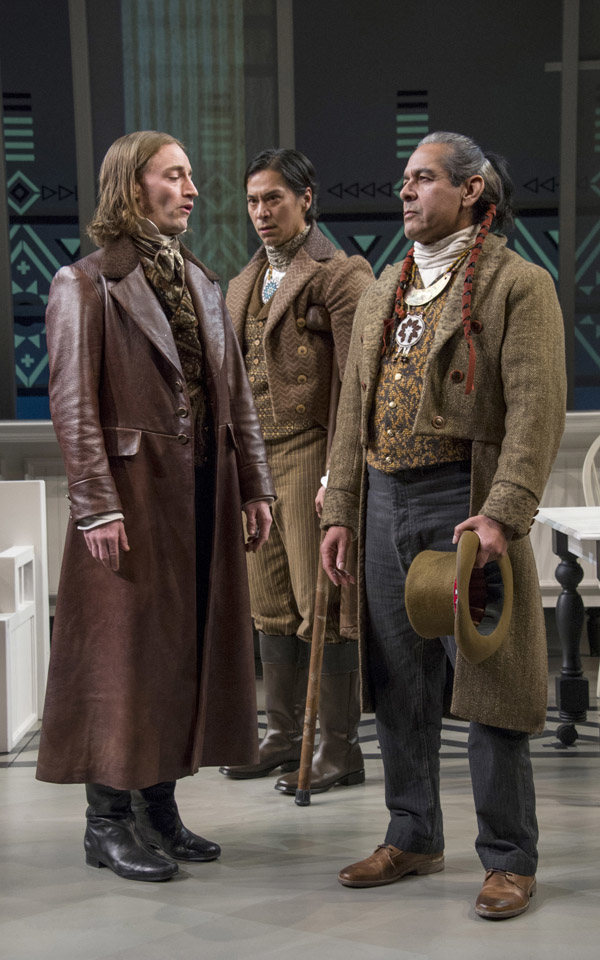Mary Kathryn Nagle Reminds D.C. Audiences Just Whose Land They're Living On
”Sovereignty” unites family history with an overlooked piece of America’s past.
"At a very young age, my grandmother taught me that the Supreme Court is an institution to be respected." It's an unconventional childhood lesson but one that ended up being the seed of Mary Kathryn Nagle's binary career as both playwright and lawyer. Nagle, a citizen of the Cherokee Nation of Oklahoma, is a direct descendent of Cherokee politician Major Ridge and his son John Ridge, who asserted the sovereignty of the Cherokee Nation and saw it protected by the Supreme Court in the 1832 ruling of Worcester v. Georgia. "When the rest of the United States tried to extinguish us, the Supreme Court upheld our right to exist," said Nagle. "So in my mind it was law school, law school, law school."
She stuck to the plan, but along the way, she won an undergraduate playwriting competition at Georgetown, produced plays with her fellow law students at Tulane, and, while clerking for a federal judge, penned a theatrical reenactment of Standing Bear v. Crook. Now a partner at a firm that specializes in the sovereignty of Native tribes, Nagle is also receiving her first major regional premiere at Washington, D.C.'s Arena Stage with a historical play fittingly titled Sovereignty, which connects the story of Worcester and the Ridges with the battles still being fought by the people of Cherokee Nation. Like her other work, the play pulls from her Native heritage, but this time, the characters are her grandfathers and the story is in her D.N.A .

(photo provided by Arena Stage)
This article has been edited and condensed for clarity.
What inspired you to write Sovereignty, and how did it find its way to Molly Smith at Arena Stage?
My agent was sending my script Manahatta to everyone, and I desperately wanted to see it produced, but we were getting "no, no, no, no, no" for two years. Then I got a call from Molly, and she said my agent sent her Manahatta, and she said, "I love it so much I want to commission you to write a play for us about the story in D.C. that people living in D.C. don't know about Indians." That was the genesis of Sovereignty.
What was it about Manahatta that caught Molly's attention?
One of the things she thought was so compelling about Manahatta is that it's a story being told in New York about Indians in New York. Most people don't know whose land they're living on, which, when you think about it, is pretty profound — to not know who was there before you and how they were removed from the land they were living on. What purpose does that ignorance serve? I think it does us all harm at the end of the day. And Molly had the foresight to say, "Come to D.C. and do a play about Indians in D.C."
Were other theaters not as receptive to that subject matter?
I've been told several times by theaters in New York that the stories of Native Americans from the 1800s and early 1900s are "irrelevant" to contemporary Americans. When Molly Smith commissioned me and said, "What about a play about your grandfather?" I said, "No other theater wants to touch that story because it's in the past and they don't think it's relevant to today." She said, "Of course it's relevant to today!" That was in 2015 — before Donald Trump said he was going to run for president. He then runs for president and starts praising Andrew Jackson. He then wins the presidency and places a portrait of Andrew Jackson in the oval office. Now there's a whole conversation about that portrait and what it means for president Trump to look to Andrew Jackson for guidance for his policies. I think if anyone now wanted to say that the story of what Andrew Jackson did to my grandfathers and the Cherokee Nation is irrelevant, we'd laugh at them.
Did you learn any of this history in school or was it all passed down through your family?
In the public schools there was pretty much nothing. My grandmother taught me about our grandfather and the Supreme Court case that John Ridge worked on with Chief John Ross and how they took the case up to the United States Supreme Court and won. And how my grandfather signed the treaty of New Echota. Many people in Cherokee Nation think that treaty caused the Trail of Tears and was a horrible document. I see that treaty as the United States' promise that Cherokee Nation will always be able to exercise jurisdiction over Cherokee lands regardless of who's committing a crime.
That brings us to the subject of the Violence Against Women Act, which the play touches on and which is also up for reauthorization this year. Can you explain why that law is so significant for native tribes?
My great-great-great-grandfather, Major Ridge, was serving as speaker of our tribal council in 1825 when our tribal council passed a law outlawing the rape of Cherokee women on Cherokee land regardless of race and citizenship. If you are a citizen of France, if you are a citizen of England, if you are a citizen of the United States, or if you're a citizen of Cherokee Nation, it didn't matter. If you came onto Cherokee land and raped a woman, Cherokee Nation would prosecute you. And no one questioned Cherokee Nation's right to do that until Georgia passed a law in 1831 outlawing any American citizen from entering Cherokee land without Georgia's permission. And this went all the way up to the Supreme Court with Worcester v. Georgia. The question was: What sovereign can exercise criminal jurisdiction over American citizens on tribal land? Georgia argued that the United States Constitution prevents tribal nations from exercising criminal jurisdiction over non-Indians, and Georgia lost! Fast forward to Oliphant v. Suquamish in 1978 and the Supreme Court took away our tribe's inherent criminal jurisdiction that had been affirmed in Worcester v. Georgia in 1832. Now, the significance of the Violence Against Women Act in 2013 is that Congress and President Obama who signed it into law restored a sliver of the jurisdiction that Oliphant took away. Not all of our tribal jurisdiction has been restored, but if it's a non-Indian perpetrating domestic violence, dating violence, or a violation of protection orders, tribal nations can now prosecute .
Do you think that's in danger of going away?
It's always in danger of going away. Even though most Americans don't, we know our history. Our grandparents told us their stories of how this was taken away, this treaty was violated, this guarantee was stripped from us. I've always said Andrew Jackson is not unique. He reflects a dominant American culture that is still alive and well today. But we have a myopic view of American history. Why don't we teach this part of our history in school? Why is this left out? I think this play is educating the American public on something that our schools don't teach us — that tribal jurisdiction over non-Indians isn't unconstitutional, it's pre-constitutional.

(© C. Stanley Photography)








